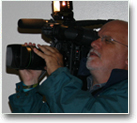 Personal Response Systems ("Clickers") Make Trent University Classes More InteractiveFOR IMMEDIATE RELEASE New Technology Fosters More Learning During Class Time October 10, 2006, Peterborough Interactive teaching has long been a hallmark of Trent University. However with the introduction of Personal Response Systems, or "clickers", into the classroom this fall, the learning experience for students promises to become even more dynamic. As part of a new pilot project at Trent University, clickers will be used to help teach over 1,000 students in some Chemistry, Environmental Science, Biology, Physics, Psychology and Education courses. Although clickers represent one of several techniques used by faculty to interact with their students, their ability to personalize the learning environment is viewed as a significant enhancement. Professor Al Slavin has used class discussion and manual voting for several years as a primary mode of instruction in physics classes at all levels. To improve the method of voting, he wrote a successful application to the Academic Innovation Fund for financial support to introduce clickers into Physics 100/102H. However, it quickly became apparent that other faculty were interested in the clicker technology, so the University adopted a single system for application in courses in several disciplines. The clickers can be used in many ways: (1) to develop conceptual understanding by having students vote on the correct answer to a multiple-choice question, after discussing it with their immediate neighbours in the class; (2) as a "warm-up" to a new topic, to gauge student understanding of the area; (3) to poll the opinions of the class on social/political issues; (4) to generate in-class data for use in a stats course; (5) to administer short summary tests on a component of the course or (6) for in-class factual tests to encourage pre-class reading for background knowledge. Prof. Slavin is excited with the new technology, "There is a new 'wow' factor when students see their opinions being displayed on the screen. They appear much more engaged than with the manual voting, and attendance seems better than in the past. However, the test of the system will be if this translates into better performance on tests and the final exam." A study in the Physics Department is in place to evaluate the effect of the clickers on student performance, and the university can expect a report a year from now. -30- For further information, contact Prof. Alan Slavin at (705) 748-1011, ext. 1289 |
































